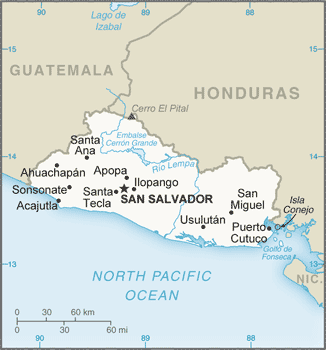
El Salvador, one of the three Northern Triangle countries of Central America (along with Honduras and Guatemala) has seen its crime rate drop by half, as new President Nayib Bukele has sent police to fight extortion and seal the country's border.
AP reported on August 16:
El Salvador's justice minister says the country's homicide rate has fallen to about 4.4 killings a day since June, about half of 2018 levels.
The country of 6.5 million people recorded 3,340 killings in 2018, or about nine a day. The bloodiest year of 2015 saw 6,425 homicides, or 17.6 a day.
Justice Minister Rogelio Rivas said Friday that "homicides are declining across the country."
That article also reveals that since his June 1 inauguration, President Bukele has been battling extortion (which provides 80 percent of the income for the country's gangs) by sending police and soldiers to shopping and commercial areas. In addition, on August 16, 72 Mara Salvatrucha (MS-13) gang members were sentenced to 260-year prison terms for their roles in 22 killings that occurred in 2014 and 2015.
On August 28, 2019, U.S. and Salvadoran officials signed a letter of intent, agreeing "to strengthen cooperation on security and migration." Acting Homeland Security Secretary Kevin McAleenan stated that the deal, which is not a "safe-third country agreement", reflects the two countries' intention "to collaborate on a broad basis on law enforcement and countering gangs, increasing border security, information sharing and economic vitality, as well as supporting the Salvadorans' own initiative on developing asylum and protection capacity." The countries also agreed to cooperation on drug trafficking, as well as other crimes.
According to AP:
Bukele, who took office June 1, said the agreement [additionally] covers the implementation of border patrols, which he said his country has been doing for several weeks.
"They have been successful because we have arrested people-traffickers, smugglers and gang members who want to cross the frontier," he said.
The day after that agreement was signed, Salvadoran authorities arrested at least 25, "including businesspeople, lawyers and a former police officer, as part of an operation to break up an alleged migrant smuggling network." That raid, which covered several of the country's municipalities, also resulted in the seizure of vehicles and property worth approximately $1 million. "Authorities said the alleged smugglers charged migrants $8,000 to $12,000 to take them to the United States, though many were abandoned en route." Between the beginning of June and the middle of September, according to Justice and Public Safety Minister Rogelio Rivas, 159 immigrant smugglers had been arrested in the country.
The August 28 meeting was followed up by a "cooperative asylum agreement" on September 20, which was signed by McAleenan and Alexandra Hill Tinoco, El Salvador's foreign minister. Pending the completion of legal actions, and the implementation of "major border security and asylum procedures" (as well as a potential U.S. aid package), that agreement would allow the United States to send third-country asylum seekers to that country if they passed through El Salvador on their way to the United States.
In addition, AP reported on September 12 that El Salvador was deploying 800 police officers and soldiers (to be joined by 300 immigration agents) to its borders and airports to "target criminal structures that traffic people, in addition to violent groups who force Salvadorans to flee the country." That deployment was part of the August 28 agreement.
And continuing President Bukele's anti-corruption theme, on September 30:
Authorities in El Salvador say they have broken up a criminal network involving police officers — including some elite forces — that allegedly carried out more than two dozen contract killings.
...
Thirty-nine warrants were issued.
The alleged crimes include 20 individual murders plus multiple killings of up to five people as well as three kidnappings, all committed in 2016-2017.
As President Bukele told Martha McCallum on Fox News on September 26: "Whose job is it to fix El Salvador? It's El Salvador's job, right? So, we have [taken] the problem as our own."
If there is any positive side to the humanitarian and national-security disaster at the Southwest border, it is the fact that countries throughout the Northern Triangle have been forced (often by or at the urging of the Trump administration) to confront their own problems. Bukele, an outsider from the country's two-party system who won the presidency on an anti-corruption platform with promises to limit migration out of El Salvador, has begun taking steps to do just that.
